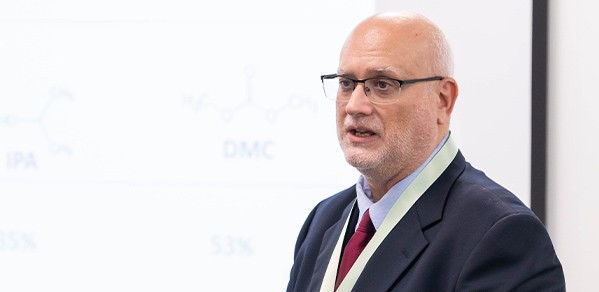
The University’s overseas research centre in Singapore has launched a new project, which will investigate non-fossil fuel-based pathways for the country’s chemical manufacturing industry and energy systems.
In just a decade, Cambridge CARES has established cutting-edge R&D facilities dedicated to decarbonisation projects that not only reduce emissions but also pave the way for a more sustainable future for Singapore.
Mr Heng Swee Keat, Deputy Prime Minister of Singapore
The project titled Hydrogen and Ammonia Combustion in Singapore (HYCOMBS) is led by Cambridge engineer Professor Epaminondas Mastorakos, Director of Industrial Relations at the Cambridge Centre for Advanced Research and Education in Singapore (CARES). It is one of two projects launched, which aims to aid Singapore’s business transition away from petrochemicals towards a net zero emissions target by 2050.
Project HYCOMBS is part of the newly launched CREATE Thematic Programme in Decarbonisation, supported by the National Research Foundation (NRF). It involves universities from Singapore, the UK, Japan, France, and Norway, working together to investigate the underlying combustion process of hydrogen and ammonia to minimise pollutants and accelerate industry innovation.
In 2022, Singapore’s National Hydrogen Strategy was launched with the aim to accelerate the development and deployment of hydrogen as a major decarbonisation pathway. It is anticipated that by 2030, at least nine hydrogen-ready power plants will be in situ, with low-carbon hydrogen potentially accounting for around 50% of Singapore’s electricity mix by 2050.
Last month, Deputy Prime Minister of Singapore and Chairman of the NRF, Mr Heng Swee Keat, toured the first of three laboratories set up for the CREATE Thematic Programme in Decarbonisation. This included the HYCOMBS project and the Sustainable Manufacture of Molecules and Materials in Singapore (SM3) project.
Speaking at the time, Mr Heng Swee Keat said: “The need to tackle climate change and its impact grows ever more urgent. During my visit to Cambridge CARES – Cambridge University’s first and only research centre outside the UK – I witnessed how research and international collaboration are driving innovative solutions to combat climate change, particularly in the area of decarbonisation.
“In just a decade, Cambridge CARES has established cutting-edge R&D facilities dedicated to decarbonisation projects that not only reduce emissions but also pave the way for a more sustainable future for Singapore. From hydrogen combustion and laser-based combustion diagnostics to the development of cleaner fuels for gas stoves, their work is closely aligned with the goals outlined in our Singapore Green Plan 2030, and achieving Singapore’s net zero emissions goal by 2050.
“It was encouraging to hear from former Director of Cambridge CARES [2013-2024], Professor Markus Kraft, as he shared how being based in the CREATE facility at the National University of Singapore facilitates interactions with researchers from diverse countries and disciplines. This collaborative and interdisciplinary approach embodies the essence of research – working together to address shared global challenges.”
Since 2013, Cambridge CARES has been involved in research programmes with Nanyang Technological University and the National University of Singapore as the University of Cambridge’s first overseas centre. One of its early flagship programmes, the Centre for Carbon Reduction in Chemical Technologies (C4T), has investigated areas from sustainable reaction engineering, electrochemistry, and maritime decarbonisation to digitalisation.
By building on this foundation and leveraging the local talent pool, Cambridge CARES has attracted new partners from international universities and institutes for SM3 and HYCOMBS. This includes EPFL, the Swiss Federal Institute of Technology Lausanne, which will provide skills in the domain AI for chemistry. CNRS, the French National Centre for Scientific Research, the Norwegian University of Science and Technology, and Tohoku University from Japan will contribute technical equipment and key talent in hydrogen and ammonia combustion.
Adapted from a University of Cambridge news article.

